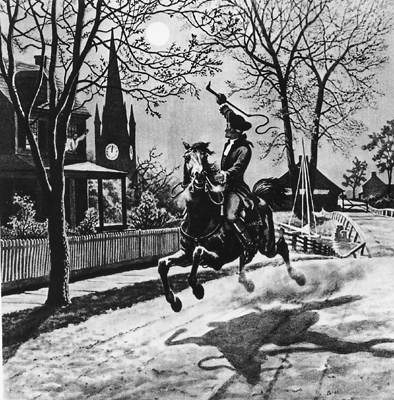
In researching this page, I learned a lot of interesting things about Paul Revere and the rides that were taken that fateful
night. One of the things I'd forgotten was that Paul Revere wasn't the only rider galloping through the countryside warning
people of the arrival of the British troops. It was Henry Wadsworth Longfellow, over a hundred years later, who made Paul
Revere famous in his poem, which has always been a favorite of mine. Such exciting reading...hoofbeats pounding on the road
to Lexington...the moon casting eerie shadows on the graveyards...fording fog-shrouded rivers...British soldiers in wait at
every turn...the fate of a nation hanging in the balance!
By the way, did you know that Paul Revere probably didn't say, "The British are coming!" It was more likely, "The Regulars
are out!"
I found a great poem of parody dedicated to one of the other riders, "The Midnight Ride of William Dawes." I'm including it
below. The third rider was Dr. Samuel Prescott, who died in 1777, after having been captured by the British during a battle.
There seems to be some debate about exactly who arrived where, when, but it doesn't take away from the tale. It's still
intriguing.
I found some excellent websites on this subject during my cyber-search and I've added those links to the Friday's Journal
Links page. But, enough talk, it's time to start the journey! Nancy
night. One of the things I'd forgotten was that Paul Revere wasn't the only rider galloping through the countryside warning
people of the arrival of the British troops. It was Henry Wadsworth Longfellow, over a hundred years later, who made Paul
Revere famous in his poem, which has always been a favorite of mine. Such exciting reading...hoofbeats pounding on the road
to Lexington...the moon casting eerie shadows on the graveyards...fording fog-shrouded rivers...British soldiers in wait at
every turn...the fate of a nation hanging in the balance!
By the way, did you know that Paul Revere probably didn't say, "The British are coming!" It was more likely, "The Regulars
are out!"
I found a great poem of parody dedicated to one of the other riders, "The Midnight Ride of William Dawes." I'm including it
below. The third rider was Dr. Samuel Prescott, who died in 1777, after having been captured by the British during a battle.
There seems to be some debate about exactly who arrived where, when, but it doesn't take away from the tale. It's still
intriguing.
I found some excellent websites on this subject during my cyber-search and I've added those links to the Friday's Journal
Links page. But, enough talk, it's time to start the journey! Nancy
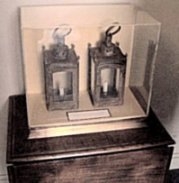
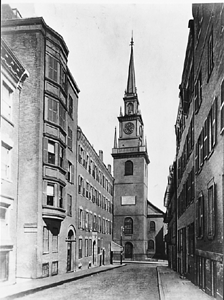
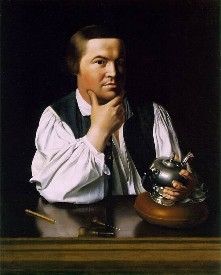
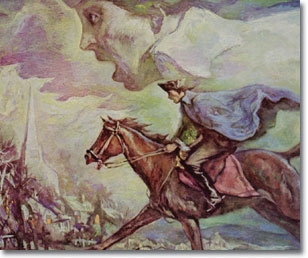
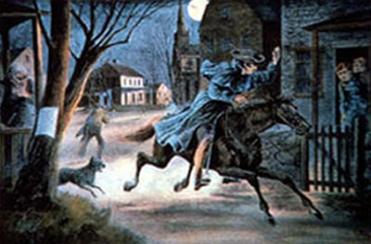
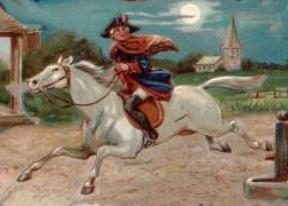
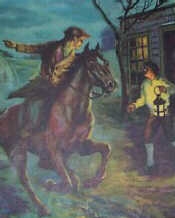
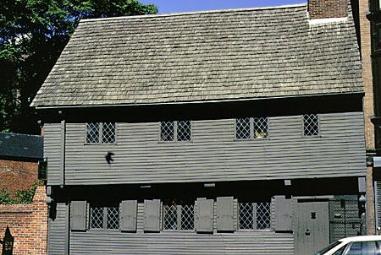
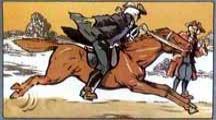
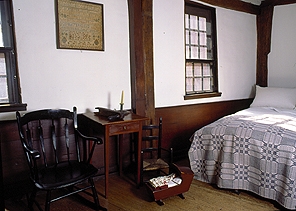
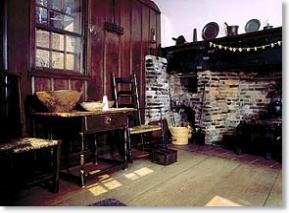
| The Midnight Ride of Paul Revere by Henry Wadsworth Longfellow Listen, my children, and you shall hear of the midnight ride of Paul Revere, On the eighteenth of April, in Seventy-five; hardly a man is now alive Who remembers that famous day and year. He said to his friend, "If the British march by land or sea from the town tonight, Hang a lantern aloft in the belfry arch of the North Church tower as a signal light, One if by land, and two if by sea; and I on the opposite shore will be, Ready to ride and spread the alarm Through every Middlesex village and farm, For the country folk to be up and to arm." Then he said, "Goodnight!" and with muffled oar silently rowed to the Charlestown shore, Just as the moon rose over the bay, where swinging wide at her moorings lay The Somerset, British man-of-war; a phantom ship, with each mast and spar across the moon like a prison bar, And a huge black hulk, that was magnified by its own reflection in the tide. |
| Meanwhile, his friend through alley and street wanders and watches, with eager ears Till in the silence around him he hears the muster of men at the barrack door, The sound of arms, and the tramp of feet, and the measured tread of the grenadiers, Marching down to their boats on the shore. Then he climbed the tower of the Old North Church, by the wooden stairs, with stealthy tread, To the belfry chamber overhead, and startled the pigeons from their perch On the sombre rafters, that round him made masses and moving shapes of shade, By the trembling ladder, steep and tall, to the highest window in the wall, Where he paused to listen and look down a moment on the roofs of the town And the moonlight flowing over all. |
| Beneath, in the churchyard, lay the dead, in their night encampment on the hill, wrapped in silence so deep and still that he could hear, like a sentinel's tread, The watchful night-wind, as it went creeping along from tent to tent, And seeming to whisper, "All is well!" A moment only he feels the spell Of the place and the hour, and the secret dread of the lonely belfry and the dead; For suddenly all his thoughts are bent on a shadowy something far away, where the river widens to meet the bay, A line of black that bends and floats on the rising tide like a bridge of boats. Meanwhile, impatient to mount and ride, booted and spurred, with a heavy stride On the opposite shore walked Paul Revere, now he patted his horse's side, Now he gazed at the landscape far and near, then, impetuous, stamped the earth, and turned and tightened his saddle girth; But mostly he watched with eager search the belfry tower of the Old North Church, As it rose above the graves on the hill, lonely and spectral and sombre and still, and lo! as he looks, on the belfry's height A glimmer, and then a gleam of light! He springs to the saddle, the bridle he turns, But lingers and gazes, till full on his sight a second lamp in the belfry burns. |
| Eighteenth of April in Seventy-Five |
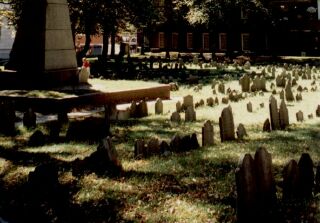
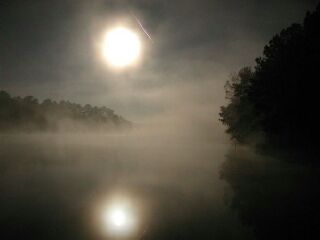
| A hurry of hoofs in a village street, a shape in the moonlight, a bulk in the dark, And beneath, from the pebbles, in passing, a spark struck out by a steed flying fearless and fleet; That was all! And yet, through the gloom and the light, the fate of a nation was riding that night; And the spark struck out by that steed, in his flight, Kindled the land into flame with its heat. He has left the village and mounted the steep, and beneath him, tranquil and broad and deep, In the mystic, meeting the ocean tides; And under the alders that skirt its edge, now soft on the sand, now loud on the ledge, Is heard the tramp of his steed as he rides. It was twelve by the village clock when he crossed the bridge into Medford town. He heard the crowing of the cock, and the barking of the farmer's dog, And felt the damp of the river fog, that rises after the sun goes down. |
| It was one by the village clock, when he galloped into Lexington. He saw the gilded weathercock swim in the moonlight as he passed, And the meeting-house windows, black and bare, gaze at him with a spectral glare, As if they already stood aghast at the bloody work they would look upon. It was two by the village clock, when he came to the bridge in Concord town. He heard the bleating of the flock and the twitter of birds among the trees and felt the breath of the morning breeze Blowing over the meadow brown. And one was safe and asleep in his bed who at the bridge would be first to fall, Who that day would be lying dead, pierced by a British musket ball. |
| You know the rest. In the books you have read How the British Regulars fired and fled, How the farmers gave them ball for ball, from behind each fence and farmyard wall, Chasing the redcoats down the lane, then crossing the fields to emerge again Under the trees at the turn of the road, and only pausing to fire and load. So through the night rode Paul Revere; and so through the night went his cry of alarm To every Middlesex village and farm, a cry of defiance and not of fear, A voice in the darkness, a knock at the door, and a word that shall echo for evermore! For, borne on the night-wind of the Past, through all our history, to the last, In the hour of darkness and peril and need, the people will waken and listen to hear The hurrying hoof-beats of that steed, and the midnight message of Paul Revere. |
| Above, left, Paul Revere; right, his home in Boston, as it looks today; the house was constructed in 1680 and is the oldest home still standing in Boston. Below, left, the kitchen; right, his bedroom. |
| The lanterns which hung in the North Church (seen left in a photo ca 1890) on the night of April 18, 1775. |
| The following was sung at the completion of the Concord Monument, April 19, 1836. By the rude bridge that arched the flood, their flag to April's breeze unfurled, Here once the embattled farmers stood and fired the shot heard round the world. The foe long since in silence slept; alike the conqueror silent sleeps; And Time the ruined bridge has swept down the dark stream that seaward creeps. On this green bank, by this soft stream, we set today a votive stone; hat memory may their deed redeem, when, like our sires, our son's are gone. Spirit, that made those heroes dare to die, and leave their children free, Bid Time and Nature gently spare the shaft we raise to them and thee. -- Ralph Waldo Emerson |
| The Midnight Ride of William Dawes I am wandering, bitter shade, never of me was a hero made; Poets have never sung my praise, nobody crowned my brow with bays; And if you ask me, the fatal cause, I answer only, "My name was Dawes." 'Tis all very well for the children to hear of the midnight ride of Paul Revere; But why should my name be quite forgot, who rode as boldly and well, God wot? Why should I ask? The reason is clear - my name was Dawes and his Revere. When the lights from the old North Church flashed out, Paul Revere was waiting about, But I was already on my way, the shadows of night fell cold and gray As I rode, with never a break or a pause; but what was the use, when my name was Dawes! History rings with his silvery name; closed to me are the portals of fame. Had he been Dawes and I Revere, no one had heard of him, I fear. No one has heard of me because he was Revere and I was Dawes. -- Helen F. Moore, 1896 |